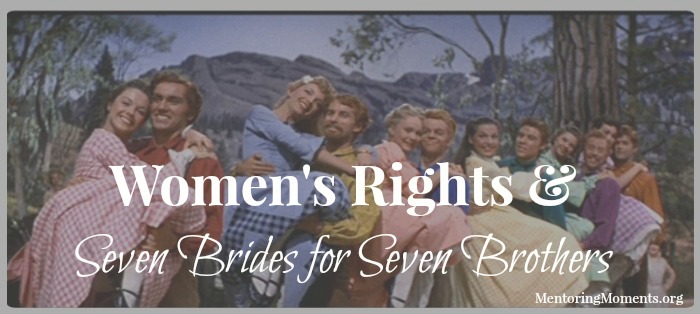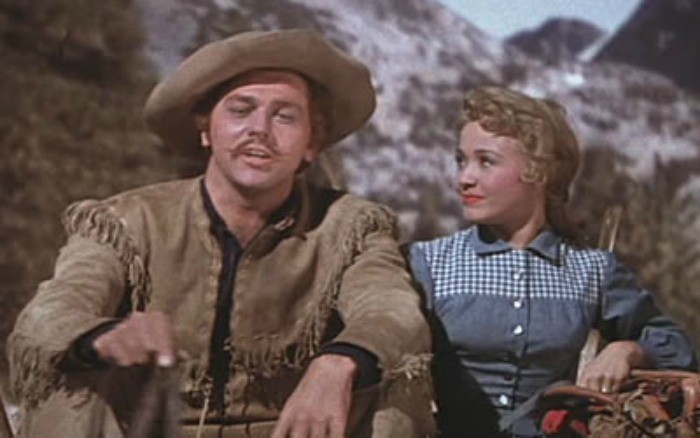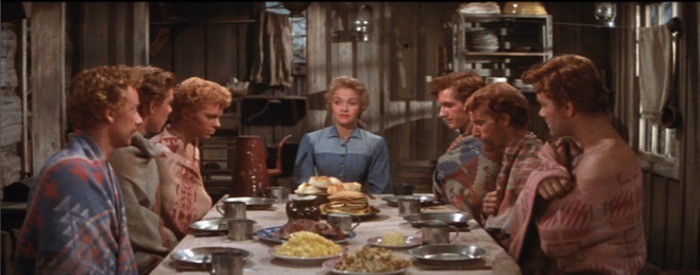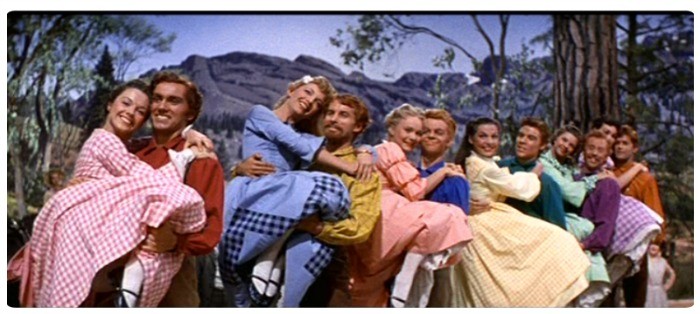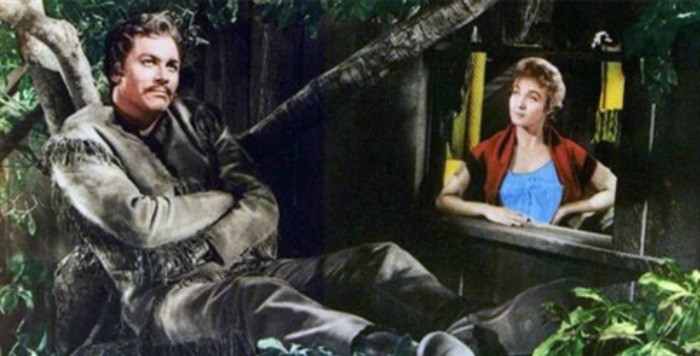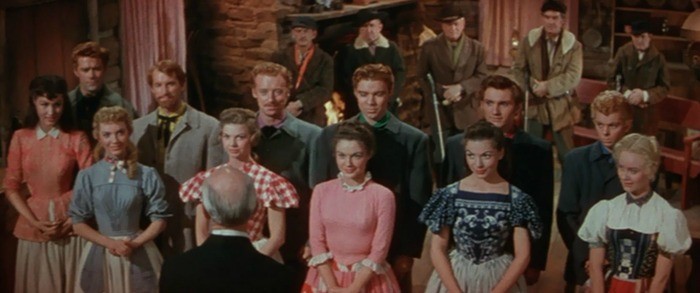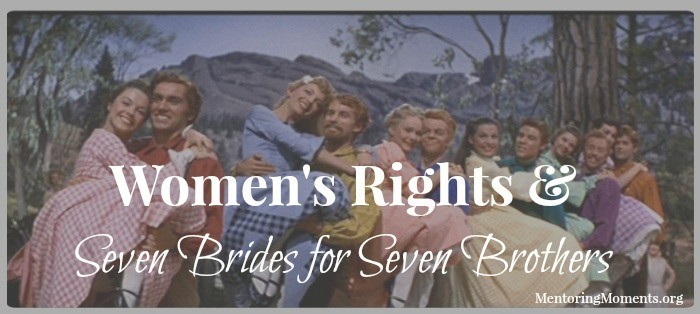Seven Brides for Seven Brothers is a 1954 musical comedy based on the short story “The Sobbin’ Woman” by Stephen Vincent Benet. It’s one of those oldies and goodies that I’ve watched many times and that never grows old. When I showed it to my young teen granddaughters, who had never heard of it, they were entranced and amazed.
Handsome (baritone) Howard Keel plays Adam Pontipee, the eldest of seven brothers, who leaves his backwoods home in the Rockies in the mid-1800s to go to the nearest town to get a wife. He meets Milly, a pretty young woman played by Jane Powell.
Milly has no family and is working as a waitress to support herself. Adam explains that he is looking for a wife and—remarkably—she agrees to marry him that same day.
After a long wagon ride, they arrive at his cabin where, to her shock, she discovers that he lives with his six handsome but unkempt adult brothers in a virtual state of filth.
So her honeymoon begins.
Milly cleans, does laundry, cooks, and tries to reform her husband’s uncouth siblings who eat like animals and fight with each other. When they see how gracious and sweet Milly is, the brothers become anxious to get wives of their own.
Milly reads to the boys a story about the Roman capture of the Sabine women from one of her books. Taking an idea from the story, Adam thinks he’s found a solution to his brothers’ loneliness: he’ll kidnap brides for them!
Without telling Milly, all the men go to town and kidnap the women they met and were attracted to at a barn raising (that scene has some of the best acrobatic dancing any musical has ever produced).
On the wild wagon ride back to the cabin, the brothers shoot their guns to cause an avalanche to clog the pass. The girls’ fathers and brothers who are pursuing them are blocked and can’t get through the pass to rescue the girls until the spring thaw. But there will be no weddings either—because they forgot to bring the preacher. Milly, to protect the reputation of the women, throws the men out of the house, including Adam because of what he has done.
While his brothers sleep in the barn, Adam goes off to a shack in the mountains to brood over what he considers unfair treatment. He doesn’t understand the harm he has done until his youngest brother comes in the spring to tell him that he is a father.
“A girl of course,” Adam says of the baby announcement. But he suddenly realizes that if someone kidnapped his little girl, he would be ready to kill that person.
He goes home and starts rounding up the young women to take them back to their families because the pass is almost clear. But he finds they are fighting him; they have each fallen in love with their particular man and don’t want to leave.
SPOILER ALERT: In the midst of the chaos, the girls’ fathers and brothers show up with the sheriff. When the fathers hear a baby cry, they prepare for a “shotgun wedding.” (The preacher is there now because one of the girls is his own daughter.) After each girl claims the baby is hers, six couples become newlyweds.
This is one of the best musicals ever made. But it is also a movie ahead of its time. It deals with women’s issues, such as why women don’t want to be taken for granted as cleaners and cooks and why women want to be treated with respect and have our feelings considered.
In the movie, the men stupidly think that their kidnapped brides will have no difficulty adjusting, even though they were given no choice in the matter. (Today that kind of thinking is associated with terrorists, not civilized people.)
Although Milly married Adam after a one-day courtship, she tells him she did so because she fell in love with him. She forfeits her own happiness and fights him at every turn when his foolish scheme brings six innocent girls into the house.
So what would a singing, dancing ’50s comedy about seven brides and seven brothers have to do with five sisters in an ancient, serious book of the Old Testament? In Numbers 27:1–11, we meet five sisters whose father has died while the children of Israel wandered in the wilderness. They lived in a time when women did not inherit land; it always passed to a male.
These sisters—Mahlah, Noah, Hoglah, Milcah, and Tirzah—won’t willingly accept that tradition. They argue their case with Moses, pointing out that their father was faithful. He wasn’t one of those who rebelled against God. Their father Zelophehad belonged to the old generation God said would die in the wilderness because they didn’t believe His word about going into Canaan to possess the land He gave them.
Notice, as the five sisters ask for the right to inherit, they were asking about something that hadn’t been specified in the Law and had never come up. So even Moses couldn’t give them an immediate answer. He had to ask God about it. This reminds us that every situation we have in our lives isn’t specifically covered in the Bible. General principles are covered and some specifics. But when we need specific guidance in gray areas, we still have to do what Moses did. Ask God about it.
Note especially that the five sisters are thinking ahead. They are asking for their father’s portion of the land that will be conquered when the children of Israel go into Canaan to take it. Their request shows that they have faith that God will do everything He said He would do.
And He does.
Joshua 17:3-5 gives the fulfillment of what the women asked for—a full 25 years later. The land that would have belonged to their father, the land Moses promised they could have, is given to them in the allotment. They don’t have to fight for it or argue about it. That decision, because of their request, was written into Scripture and the Law. From then on, women could legally inherit property.
Even though Numbers 27:1–11 is a small passage in a little-read part of the Bible, it is tremendously encouraging. It reminds us that God cares for women and our needs. The Bible is not a chauvinistic book. Although ancient Hebrew society was set up as male-led, that doesn’t mean God ever condoned the physical, emotional, or even financial abuse of women. And when we come to the New Testament, we see that Jesus Christ is the greatest example for how women should be treated. As Christian writer and playwright Dorothy Sayers wrote in Are Women Human?:
“No man should ever demean or belittle a woman, at least no man who claims The Name. For if we follow in the footsteps of Jesus, we follow a man who “never nagged at [women], never flattered, or coaxed, or patronized them; who rebuked without querulousness and praised without condescension; who took their questions and arguments seriously; who had no axe to grind and no uneasy male dignity to defend. There is no act, no sermon, no parable in the whole Gospel that borrows its pungency from female perversity; nobody could possibly guess from the words and deeds of Jesus that there was anything ‘funny’ about a woman’s nature.”
The five sisters boldly asked God for their inheritance. We too have an inheritance. Part of it has already been given to those who know Christ personally. It’s the peace and joy that salvation brings. But there is also more to come after this life. First Peter 1:4 speaks of the “inheritance that can never perish, spoil or fade. This inheritance is kept in heaven for you.”
©2016 by Vicki Huffman
*Affiliate links included.
About Vicki Huffman
National award-winning journalist Vicki Huffman's latest book is Soon to Come: The Revelation of Jesus Christ. It is a verse by verse exposition of the only purely prophetical book in the New Testament. Her other five books are: The Jesus Moses Knew: How to See Christ in the Old Testament; A Secret Hope (novel); Still Looking: Finding the Peace of God in Job Loss; Plus Living: Looking for Joy in All the Right Places, and The Best of Times. All are available in print and e-book on amazon.com. Vicki is a national award-winning author who has taught the Bible for many years. She was an editor for several Christian publishing houses, including Thomas Nelson and David C. Cook Ministries.
- Web |
- More Posts(120)

